Menu

Tippecanoe County Criminal Defense Lawyer

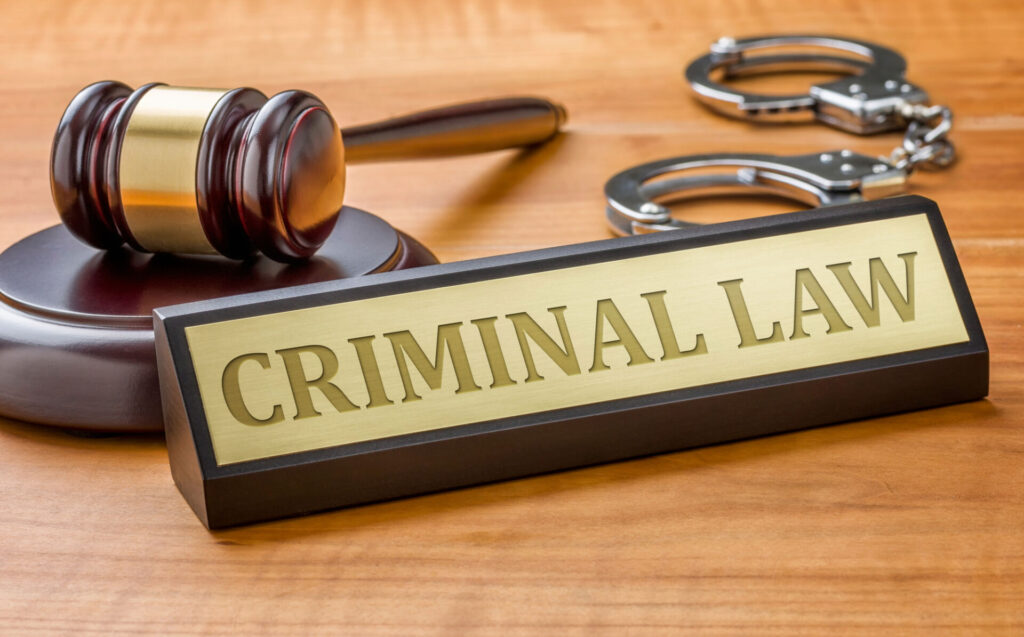
Criminal Defense Lawyer Tippecanoe County, In
Legal cases can be tricky and challenging to work on, especially cases that involve defending against a client’s criminal charges, as our Tippecanoe County, IN criminal defense lawyer knows. When you do not have much knowledge about your rights, the law and court system, you may struggle to orient yourself. Laws are difficult to understand and you may not realize how they affect you and your case. By meeting with our lawyer you can gather the key information that you need to adequately understand your legal situation, defend your rights, and discover what strategies and solutions are worth considering. However, you should not delay seeking legal advice, so contact our lawyer from Hall-Justice Law Firm LLC right away to obtain more information.
Experienced Legal Team
At our firm, we have a dedicated team of legal professionals who are committed to providing clients the legal services that they need to resolve their case. Dealing with criminal charges can be stressful and intimidating on your own, so we recognize the importance of being able to provide legal presentation that is reliable and trusted for every client. With years of legal experience and successful case results, our team knows what it takes to get clients the results that they deserve. For more information, contact our firm now.
Building A Criminal Defense
Creating a strong and persuasive criminal defense demands in-depth knowledge of the law, court processes, compelling evidence, and a strong understanding of legal strategies. Clients rarely have sufficient legal knowledge to defend against charges on their own, so that is where our defense attorney comes in. We have the case experience and skill set to be able to prepare a defense that can help clients beat the odds and get their charges reduced or dropped altogether.
How A Lawyer Can Assist You
Our Tippecanoe County criminal defense lawyer can help clients in a variety of ways, from providing a detailed case assessment, explaining their rights and searching for ways to build the best possible defense. Our lawyer understands the legal system well and we have a strong record of advocating for many different clients across a range of various criminal defense scenarios. You can rely on our lawyer to review your case closely and do the key steps to build your case, such as gathering evidence, preparing documents and communicating with parties such as witnesses and investigators. Defendants who have our lawyer are much more likely to have their criminal charges dropped than those who do not have a lawyer to guide them.
Request Urgent Legal Counsel Today
Making decisions regarding a legal matter is far from straightforward and easy. If you want to receive personalized support as you deal with your criminal charges, you can benefit from meeting with our knowledgeable and passionate lawyer who will give you support. You can receive information about your case details, the parties involved, what to expect from the case timeline and much more. Meet with our skilled and qualified Tippecanoe County criminal defense attorney from Hall-Justice Law Firm LLC now if you want to obtain the best possible outcome.
How A Criminal Defense Lawyer Can Help
Our criminal defense attorney plays an important role in the justice system by making sure that individuals accused of crimes receive fair treatment and a robust defense. There are numerous types of criminal cases where our defense lawyer’s guidance is invaluable. Four of the most common types include drug offenses, DUI (Driving Under the Influence) cases, theft crimes, and assault and battery charges. Each of these cases presents unique challenges and requires a tailored defense strategy. For more detailed information pertaining to the unique circumstances of your charges, call our firm.
Drug Offenses
Drug offenses are among the most prevalent criminal cases in many legal systems. These cases can range from simple possession of controlled substances to more severe charges such as drug trafficking or manufacturing. Our drug crime lawyer can help clients by challenging the legality of the search and seizure that led to drug discovery, questioning the evidence’s validity, or negotiating plea deals to reduce charges. In some cases, attorneys may also explore options for drug treatment programs as alternatives to incarceration, particularly for first-time offenders. The complicated aspects of drug laws and the severity of potential penalties make having skilled legal representation in these cases essential.
Driving Under The Influence (DUI) Cases
DUI cases are another common type of criminal charge, often involving individuals accused of operating a vehicle while impaired by alcohol or drugs. The consequences of a DUI conviction can be severe, including fines, license suspension, mandatory alcohol education programs, and even imprisonment. Our DUI lawyer can assist by scrutinizing the procedures followed during the arrest, such as the accuracy of breathalyzer tests or whether the police had probable cause to stop the vehicle. Additionally, we can negotiate for lesser charges or alternative sentencing options, such as probation or participation in a rehabilitation program, particularly for clients with no prior offenses.
Theft Crimes
Theft crimes encompass a wide range of offenses, including shoplifting, burglary, robbery, and grand theft. The nature and severity of these charges can vary significantly, with penalties ranging from fines and community service to lengthy prison sentences. Defense strategies in theft cases may involve challenging the prosecution’s evidence, such as the identification of the accused or the intent behind the alleged theft. Lawyers may also work to negotiate plea bargains that reduce the severity of the charges or seek alternative resolutions, such as restitution agreements, especially in cases involving minor theft or first-time offenders. The defense in theft cases often hinges on the specifics of the incident and the quality of the evidence presented by the prosecution.
Assault And Battery Charges
Assault and battery cases are common criminal charges that involve accusations of physical harm or threats of harm against another person. These charges can range from simple assault, involving minor injuries or threats, to aggravated assault, which may involve the use of a weapon or result in serious injury. Defense attorneys in these cases often focus on establishing self-defense, questioning the credibility of witnesses, or arguing that the incident was an accident rather than a deliberate act. In some situations, we may also negotiate with prosecutors to reduce charges or secure a plea deal that avoids a trial. Given the potential for significant legal consequences, including imprisonment and a criminal record, having our knowledgeable assault defense lawyer is critical in assault and battery cases.
Call Our Office For Legal Help
Our Tippecanoe County criminal defense lawyers is an essential advocate for individuals facing serious legal consequences. Whether dealing with drug offenses, DUI charges, theft crimes, or assault and battery accusations, our legal professionals work tirelessly so that our clients receive a fair trial and that your rights are protected. By challenging evidence, negotiating plea deals, and exploring alternative sentencing options, defense attorneys help mitigate the impact of criminal charges and provide essential support during a difficult time. Call Hall-Justice Law Firm LLC to make sure your rights are protected.
Tippecanoe County Criminal Defense Infographic
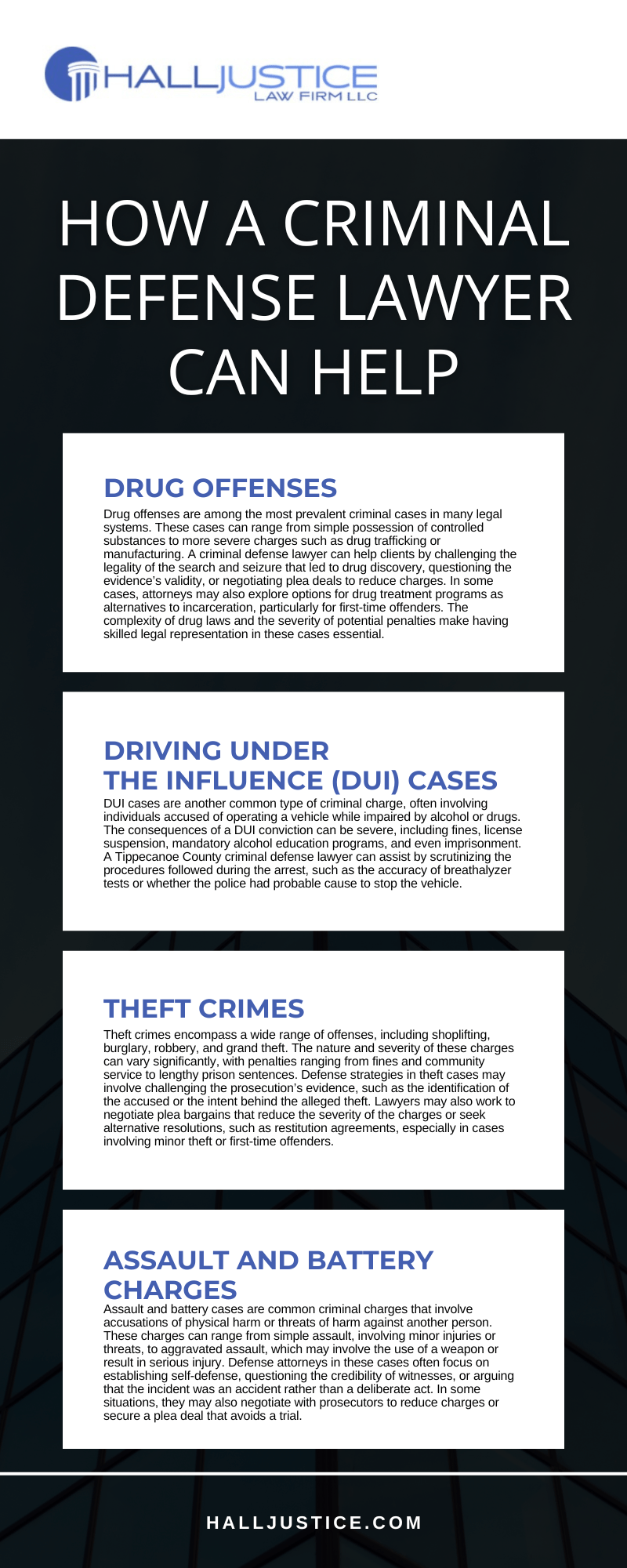
Tippecanoe County Criminal Defense Statistics
Criminal defense is a cornerstone of the U.S. justice system, ensuring that individuals accused of crimes receive fair representation and due process. The right to legal counsel is enshrined in the Sixth Amendment, and its implementation significantly impacts case outcomes.
The majority of criminal cases result in convictions, often through plea agreements. A 2019 Pew Research study found that 90% of criminal defendants pleaded guilty, and only 2% had their cases dismissed. This high rate of guilty pleas highlights the importance of effective legal counsel in negotiating outcomes.
While conviction rates are similar regardless of whether defendants have public or private attorneys, sentencing outcomes can differ. The Bureau of Justice Statistics reported that in federal district courts, 88% of defendants with publicly financed counsel received incarceration sentences, compared to 77% of those with private attorneys. This disparity suggests that the type of legal representation may influence sentencing severity.
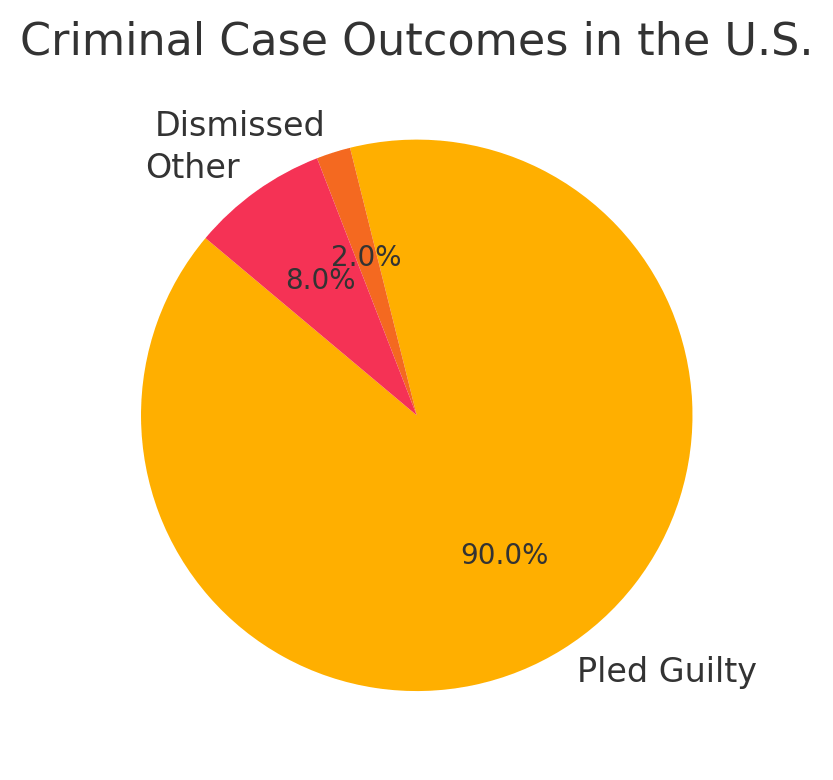
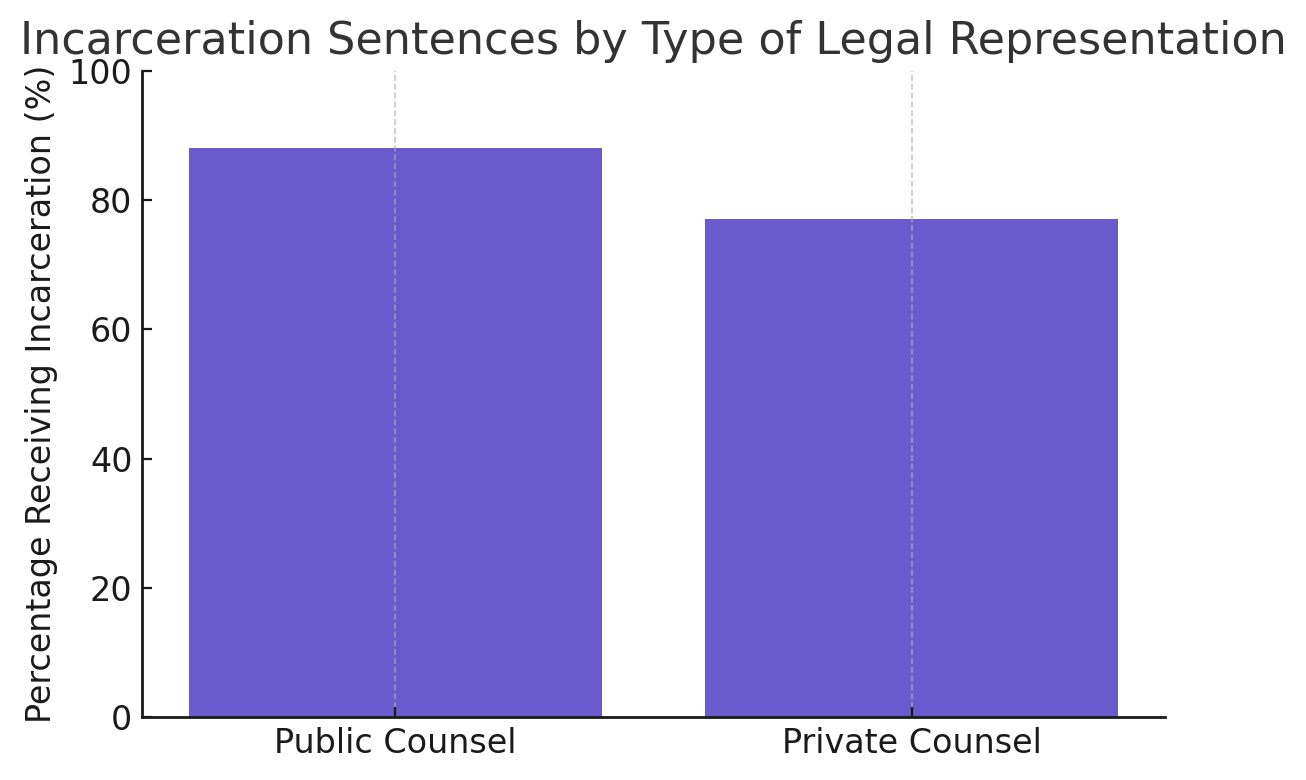
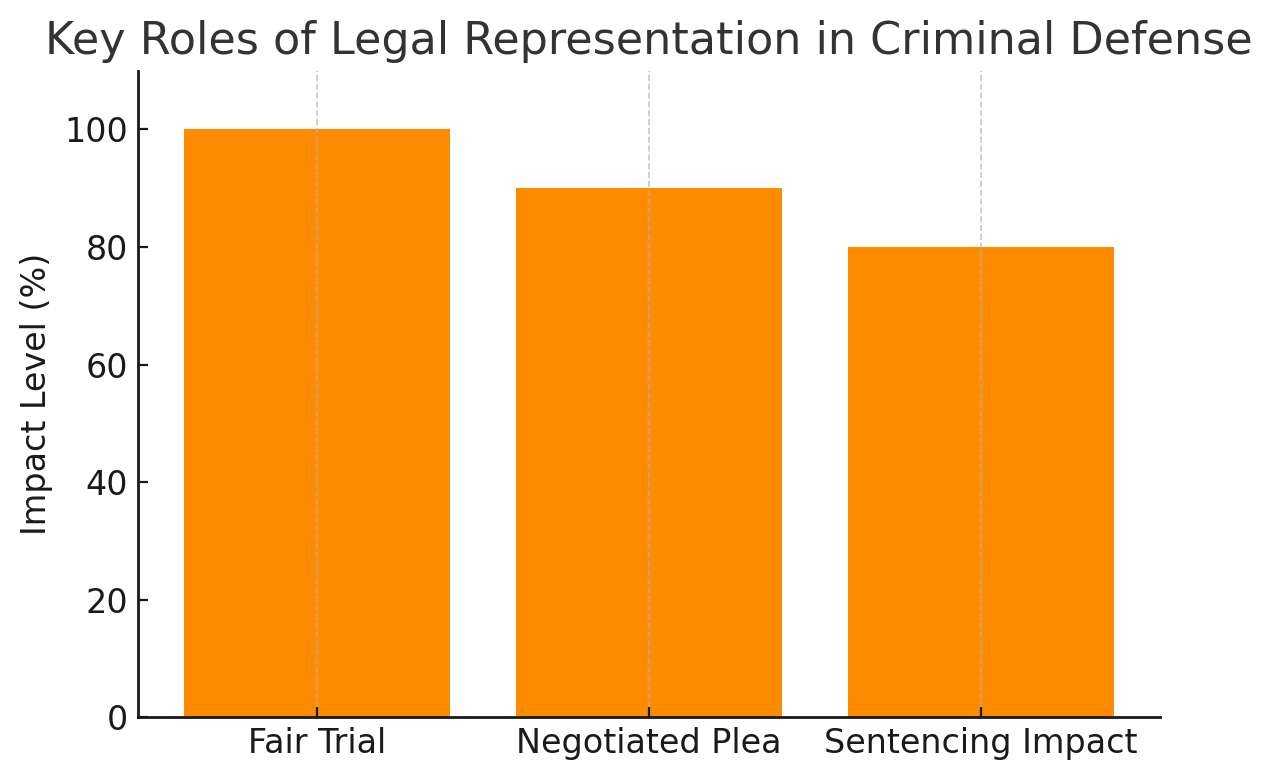
Potential Defenses To Criminal Charges
When facing criminal charges, our Tippecanoe County, IN criminal defense lawyer often relies on legal defenses to argue against the accusations and avoid conviction for their clients. These defenses can take various forms, depending on the circumstances of the case, the evidence presented, and the nature of the alleged crime. Understanding these common defenses is essential for anyone involved in the criminal justice process. If you have been charged, call us now to learn your legal options.
Innocence Defense
The most straightforward and common defense in criminal cases is the claim of innocence, where the defendant asserts they did not commit the crime. The foundation of this defense rests on the principle that the prosecution bears the burden of proving the defendant’s guilt beyond a reasonable doubt. If the defense can cast doubt on the prosecution’s evidence, the jury may find the defendant not guilty.
The defense may provide an alibi to establish innocence, showing that the defendant was elsewhere when the crime occurred. Witnesses, security camera footage, or other physical evidence may support an alibi. Additionally, the defense may challenge the credibility of the prosecution’s witnesses or evidence, raising questions about the accuracy of testimony, forensic errors, or issues like mistaken identity.
The innocence defense focuses on creating reasonable doubt in the minds of the jury. If the defense successfully raises enough doubt about the defendant’s involvement in the crime, the prosecution cannot meet its burden of proof, resulting in an acquittal.
Self-Defense
Self-defense is a commonly used defense, particularly in cases involving violent crimes like assault, battery, or homicide. When asserting self-defense, the defendant argues that they committed the alleged crime to protect themselves from imminent harm or death. In many jurisdictions, self-defense is an acceptable defense as long as the force used is reasonable and proportionate to the threat.
To successfully claim self-defense, our lawyer typically needs to prove several elements:
- Imminent threat: The defendant must show that they faced an immediate threat of harm and they believed the danger was real.
- Proportional response: The defendant must demonstrate that the force they used in response to the threat was proportional to the harm they were trying to avoid. For example, using lethal force may be justified only if the defendant faced a life-threatening attack.
- No provocation: In many cases, the defendant must prove that they did not provoke the altercation or escalate the situation.
In some states, the “stand your ground” doctrine allows individuals to use force without the obligation to retreat if they are threatened, even in public spaces. However, other states impose a “duty to retreat” if it is safe to do so before using force, especially in public.
Insanity Defense
The insanity defense is based on the argument that the defendant was mentally impaired at the time of the crime and, therefore, should not be held responsible for their actions. This defense acknowledges that the defendant committed the alleged act but asserts that they were unable to understand the wrongfulness of their actions due to a mental disorder.
The legal standards for the insanity defense vary by jurisdiction, but one of the most common tests is the M’Naghten Rule. Under this rule, the defendant must prove that, due to a mental illness, they did not understand the nature of their actions or could not differentiate between right and wrong at the time of the crime.
Another test used in some states is the Irresistible Impulse Test, which allows the insanity defense if the defendant, despite knowing their actions were wrong, could not control their behavior due to a mental illness.
While the insanity defense is often portrayed in popular media, it is rarely used and even more rarely successful. Defendants using this defense often face significant scrutiny, and if successful, they may be committed to a psychiatric facility instead of being released.
Constitutional Violations
Another common defense is based on constitutional violations that occurred during the defendant’s investigation, arrest, or prosecution. The U.S. Constitution provides several protections to individuals accused of crimes, and if these rights are violated, the defense can argue for the dismissal of charges or the exclusion of evidence obtained illegally. Some of the most common constitutional defenses include:
- Fourth Amendment violations (Illegal Search and Seizure): If law enforcement officers conducted an unlawful search or seizure without a warrant or probable cause, any evidence obtained as a result may be suppressed. This is known as the “exclusionary rule.”
- Fifth Amendment violations (Right Against Self-Incrimination): If a defendant’s confession was obtained through coercion, without being informed of their rights (Miranda rights), or while in custody without legal counsel, the defense may argue that the confession should be excluded.
- Sixth Amendment violations (Right to a Speedy Trial and Legal Representation): If the defendant’s right to a speedy trial or legal representation was violated, the defense may seek dismissal of the charges or other legal remedies.
Constitutional defenses makes sure that law enforcement and prosecutors uphold defendants’ legal rights throughout the criminal justice process. If the defense can prove a violation of these rights, it may lead to reduced charges, dismissal of the case, or suppression of critical evidence.
Call Our Office For Legal Assistance
Understanding and asserting the appropriate defense strategy is key to obtaining a fair trial and, where applicable, avoiding conviction in criminal defense cases. Whether through the innocence defense, self-defense, the insanity plea, or constitutional violations, our Tippecanoe County criminal defense lawyer plays a critical role in protecting the accused’s rights and upholding the legal process’s integrity. Contact Hall-Justice Law Firm LLC today to find out how we can help.
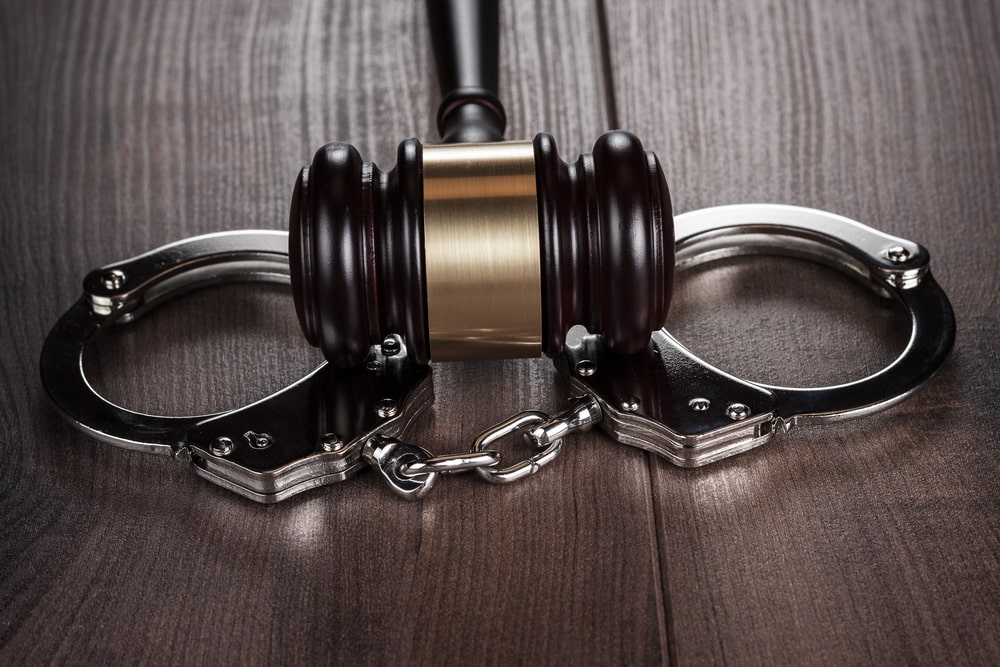
Tippecanoe County Criminal Defense FAQs
What Should I Do If I’m Arrested In Tippecanoe County?
If you’re arrested and facing charges, contacting our Tippecanoe County, IN criminal defense attorney is one of the most important steps you can take. Remaining calm and avoiding confrontations during the arrest process is essential. Exercise your right to remain silent and request to speak with our lawyer before answering any questions. Law enforcement officers are trained to collect evidence through questioning, so it’s best to have legal counsel present.
Avoid discussing your arrest or case details with friends or family until you’ve consulted our attorney. Once released, document everything you can about the arrest, including interactions with officers, witness information, and any other relevant details. These steps can provide our defense lawyer with valuable information to build a strong case.
Can A Criminal Defense Lawyer Help Reduce My Charges?
Yes, our criminal defense counselor plays a significant role in helping to reduce or dismiss charges. Through detailed case analysis, our lawyer can identify weaknesses in the prosecution’s evidence and use those to negotiate for lesser charges or even dismissal. For example, if procedural errors occurred during your arrest or investigation, our lawyer could use that to argue for a reduced penalty.
Our experienced criminal justice lawyer understands how to negotiate plea agreements that can minimize the impact of charges. Whether it’s reducing a felony to a misdemeanor or securing probation instead of incarceration, our primary goal is to seek the best possible outcome for your case.
How Much Does A Criminal Defense Lawyer Cost?
The cost of hiring our Tippecanoe County criminal defense attorney varies depending on the charges and the amount of work required. Simple cases may have a flat fee, while more involved cases, such as felonies, might be billed hourly. During your initial consultation, we will discuss fees and what services are included in those costs.
Some lawyers, including those at Hall-Justice Law Firm LLC, may offer flexible payment plans to make legal representation more accessible. By being transparent about costs upfront, we aim to help clients manage the financial aspect of their legal defense.
How Long Does A Criminal Case Typically Take To Resolve?
The duration of a criminal case depends on several factors, including the severity of the charges and whether the case goes to trial. For misdemeanors, cases may be resolved in weeks or months, particularly if a plea agreement is reached early. Felony cases or those requiring a trial often take several months to over a year.
Delays can also occur due to court scheduling or the availability of witnesses. Throughout the process, our knowledgeable Tippecanoe County criminal defense attorney will work to keep your case on track while advocating for your interests.
Can A Criminal Defense Lawyer Represent Me In Both State And Federal Courts?
Yes, our public defenders are qualified to represent clients in both state and federal courts. Our team’s commitment to protecting clients in both court systems reflects the experience and dedication we bring to every case. If your charges fall under federal jurisdiction, we’re prepared to guide you through the process with a tailored defense strategy.
Take The First Step Toward A Strong Defense
When you’re facing criminal charges, time is of the essence. At Hall-Justice Law Firm LLC, our experienced attorneys are ready to stand by your side and provide the defense you need. Contact us today to schedule a consultation and take the first step toward protecting your future.


EXCELLENTTrustindex verifies that the original source of the review is Google. Justice was very informative & kind & went above & beyond for me in every way she could . I highly recommend this attorney!!!!Posted onTrustindex verifies that the original source of the review is Google. Had an initial consult with the paralegal this morning. She was so polite, and very helpful. Listened, took my info and made the process very easy, in an area where I have a tough time finding attorney's. Thank YouPosted onTrustindex verifies that the original source of the review is Google. Mrs Hall did a great job in helping me get the best outcome for my case. I highly recommend her services.Posted onTrustindex verifies that the original source of the review is Google. I was fortunate to receive help from Susannah and her team. Susannah is a highly knowledgeable expert in her field. Although my requests was relatively straightforward for such an experienced professional, Susannah and her team provided me with outstanding support and answered all of my questions. I recommend discussing your specific situation with Susannah—even if it feels stressful—because she is excellent at analyzing circumstances and presenting clear options and potential actions. I have no doubt that Susannah and her team have the expertise to provide the best insight and guidance in their field.Posted onTrustindex verifies that the original source of the review is Google. Process went smoothlyPosted onTrustindex verifies that the original source of the review is Google. Susannah Hall-Justice is an amazing attorney! She was on top of things every step of the way and I am very thankful for her!Posted onTrustindex verifies that the original source of the review is Google. I am currently a client of hers. I do get nervous going to court or just simply meeting with her as my lawyer because I never had to be in a situation that required me to need a lawyer! I feel safe with Ms. Hall-Justice because you can just tell she has your best interest! She listens, observes and make sure you are heard! I am praying to God I don’t have to look like what I’m going through because it’s stressful and I just want to go back to my regular life with my children!Posted onTrustindex verifies that the original source of the review is Google. This attorney is definitely a credit to her craft! She is very personable and never talks down to a client. She makes a person feel like he/she is actually part of what's going on. She negotiated with the prosecutor and i was offered EVERYTHING that I had hoped for and even more! I would definitely hire her again and i highly recommend that you hire her and trust her in what is often a very vulnerable and confusing time.Posted onTrustindex verifies that the original source of the review is Google. When we needed a Lafayette attorney to represent us for various charges, Susannah was all we could have hoped for. She had several charges dropped immediately and the remaining minor charges diverted for good behavior. After two months of good behavior, all charges were dismissed. Susannah and her assistant Erica were responsive, supportive and above all very effective. All at very reasonable rates. I have worked as a criminal defense lawyer in the past and I was very impressed.Posted onTrustindex verifies that the original source of the review is Google. Impressive and refreshing. I called Susannah’s office first thing in the morning to inquire about a minor legal service and left my contact information with her assistant. Susannah personally called me back only a short while later despite how busy she undoubtedly is. It turned out that the legal opinion I required had to be from a practicing attorney in a different state so we didn’t go forward. Still, the fact that she personally returned my call, and was genuinely pleasant and attentive, substantiates her very positive and personal reviews. Not to stray into the negative but what a breath of fresh air compared to most of the attorneys with whom I’ve spoken in this area - routinely terse, rude and bumptious. This (Hall-Justice) is the law office I will call first for any future legal needs. Thank you.

